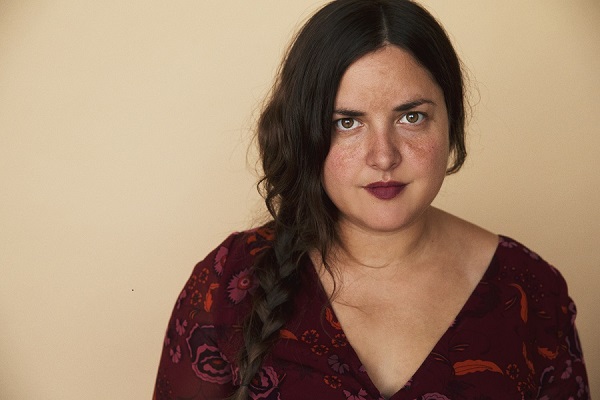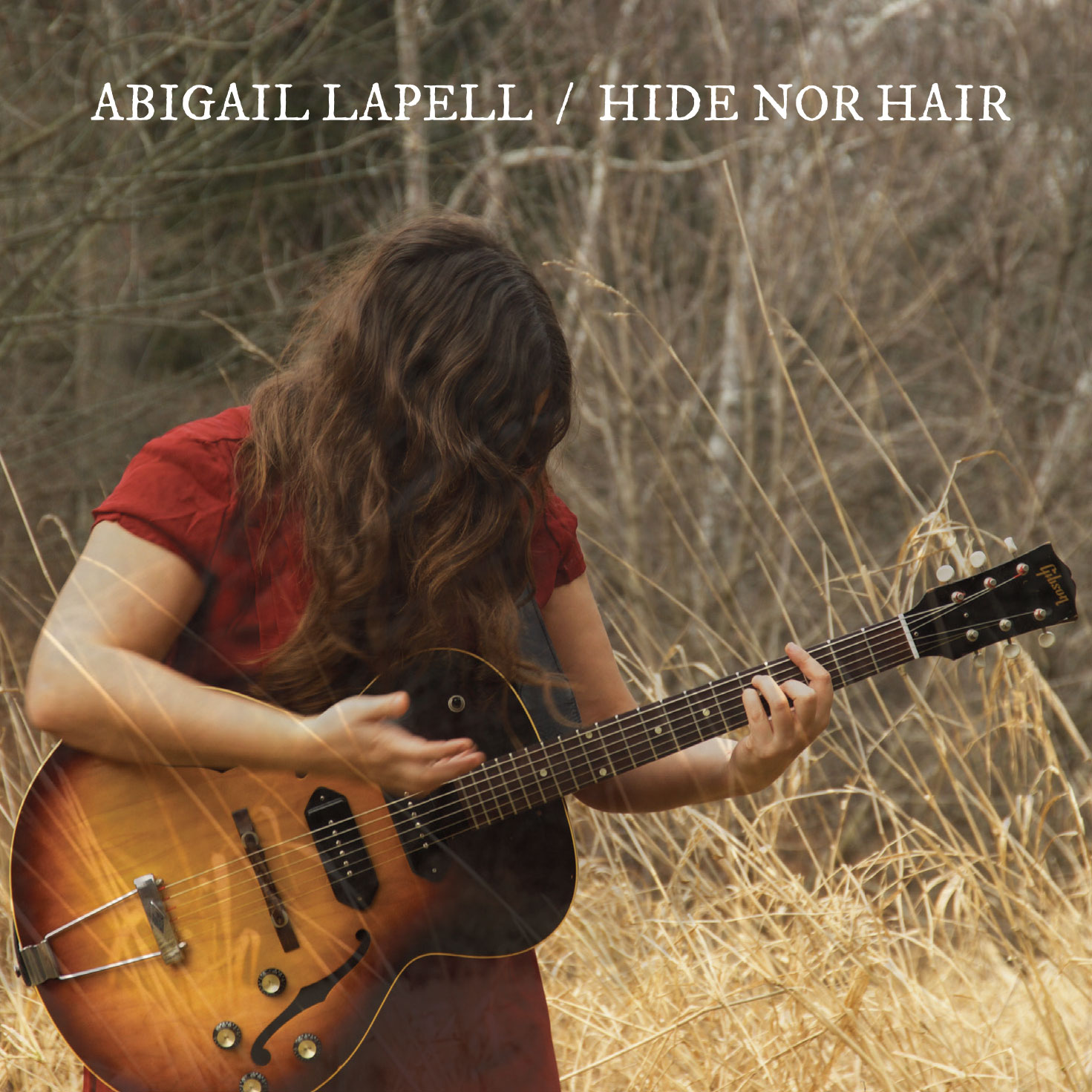With her new release, “Hide Nor Hair,” singer/songwriter Abigail Lapell has delivered an exquisite set of songs, equally beautifully played. Building on the foundation of her previous album, “Great Survivor,” this project features stunning guitar playing, haunting harmonies, and lyrics that stay in the listener’s mind for hours after the album finishes playing.
Abigail graciously took time to answer some questions for us about her new project.
This album is the first project on which you’ve worked with a producer. How did that alter your approach to writing and/or recording the songs?
I was a fan of Chris Stringer’s production on other alt-folk-type albums, and working together was a great experience. It felt very collaborative, in that I had a lot of input into the process, but at the same time, he was kind of a final arbiter to bounce ideas off and bring a different perspective–and lots of studio experience–to all those millions of creative and technical decisions. I felt really at ease focusing on my performance as a result.
Both your albums could be characterized as ‘folk’ (although I always hesitate to pigeonhole like that) – what originally drew you, and continues to draw you, to the style of music you play? Are there particular artists that influenced you on your musical path?
That term “folk” encompasses such a wide range of musical forms and styles. Personally, I think of “folk” as being about a fundamentally democratic art form. It’s for the people, by the people—existing somewhat outside the mainstream, not relying on a lot of fancy infrastructure or equipment or even specialized training. At least in principle. That’s definitely something I’m drawn to.
My favorite albums growing up were by Billy Bragg, the Clash, Cat Power, Sinead O’Connor. As a kid I was obsessed with the Beatles and Bob Dylan and Simon and Garfunkel, and later I started listening to indie and punk rock music. When I first started performing, I often ended up playing at DIY punk spaces and events, or alongside heavier bands, as a solo acoustic female singer-songwriter. It always felt like my music was really well-received in those spaces, for whatever reason. So I never particularly identified as a “folk” musician or made any distinction between my music and, like, a hardcore band.
I’d say there is also lots of ideological and aesthetic overlap between indie/punk and folk genres, especially around the idea of “authenticity” (however loaded that term can be). A lot of what I respond to personally as a listener is that feeling of raw, unvarnished expression and emotion. I’m also largely self-taught as a musician, so I relate to the idea that simple, intuitive (and even imperfect) playing can sometimes be the most powerful. One of the nicest compliments I’ve gotten recently was someone commenting that my guitar playing style was “weird” – in a good way.
You are the most recent recipient of the Ontario Arts Council’s Colleen Peterson songwriting award; obviously it’s always fantastic to be recognized by one’s peers (and rightfully so!), but has it changed, or do you anticipate it changing, your self-perception as a songwriter?
Receiving the Colleen Peterson award was such a great honour—and a huge surprise. I think in some ways it’s enhanced my sense of being part of a larger music community, of being connected to others through my songwriting. Especially as a solo musician/songwriter, I’m often working in isolation, without the benefit of a lot of immediate feedback. So it definitely feels validating to have that work acknowledged within a wider context.

I find that I can’t stop listening to “Full Moon” – I am so not a night person <g> but this song makes me want to be one. Was this song inspired by a general love of moonlight and the nighttime, or a more specific instance of it?
To me, the moon is a powerful figure of madness and a kind of wild surrender—howling at the moon, giving in to the pull of the tides. This song was loosely inspired by a poem about telling your troubles to the moon, presumably because there’s no one else left to listen, or when it starts to feel futile to tell anyone else.
There was one time in particular when I was having romantic problems and found myself ranting on and on and on to my friends and my sister and anyone who would listen… Until eventually I sort of looked up at the night sky and saw the moon and thought of that poem and the wisdom of saving your craziest ramblings for the moon instead. In my case, I think of songwriting as a mild form of madness, and somewhat equivalent to telling it to the moon.
Many of your songs evoke a sense of place – deliberately, I believe. Is it easier or more challenging to find inspiration close to home? “Flag Song,” for example, comes from a journey to Jordan, while “Jordan” (which I guess was not inspired by that Jordan!) was written during a residency in Michigan.
The tension between “home” and “away” was something that ended up recurring a lot throughout the album. The Michigan song was named after a little town, East Jordan, near that writing residency. In the first song on the album, Diamond Girl, the narrator equates love with riding “passenger side” in a car; in Indigo Blue, a tall ship and a motorcycle basically symbolize escape from the patriarchy. And one of the songs, Hostage Town, takes place in my home town of Toronto, during a huge protest, and depicts the way a familiar place can suddenly become foreign and alienating.
I do feel like traveling, and especially being on tour, there is something very ego-less about that existence—separated from all the trappings and routines that make up your identity, and being thrown into the moment. It can be interesting to try to hold on to that after returning home, to experience your town through the eyes of a tourist. So I think that is all really fertile ground to explore, whether at home or away.
As far as inspiration, I find that idea of searching for a home can be most poignant when you’re already “at home” but maybe feeling not at home (like in Hostage Town), or just restless to travel, wanderlustful. So I’d say personally I draw a lot from both, and generally write a lot of songs wherever I happen to be.
When Bob Dylan was awarded the Nobel last year, it sparked a lot of conversation about music as a vehicle for storytelling; one of my acquaintances pointed out that it perhaps takes more skill to tell a complete and moving story in under four minutes. As a songwriter, how do you see the interplay of music and story in your own work?
This is such an interesting question, and something I think about a lot. There isn’t much literal, narrative storytelling in my own songs. They’re more impressionistic and dreamlike. I never write lyrics first or work from an existing text—or even a specific theme of what the song is supposed to be about. I’m more preoccupied with melody and the sound of words or syllables, and will generally bring lyrics in much later in the process, sometimes a bit reluctantly. So my writing is closer to really self-indulgent poetry than storytelling.
But that said, and even though I don’t think of my own process as particularly literary—and I find lyrics (my own or others’) often look a bit silly on the printed page—of course songs do tell stories in a way that is valid and important. Words are primary to how most listeners experience songs, and music with lyrics is privileged over instrumental music in our culture, it seems. It strikes me as very strange that there would be any controversy about songwriting as a legitimate literary form. But people are always policing the boundaries between high art and pop forms, so I guess it’s not that surprising, either.
As far as formal constraints, like the four minute time limit you mention, or just sticking to a particular song structure or rhyme scheme (I am obsessed with rhyming) … I’d say any of those limitations can be both a help and a hindrance, creatively. Definitely they call on a different skill set than, say, writing a novel or a poem or an essay. Those things have their own constraints, though, and are (obviously) pretty hard to do well.
Honestly? I just think it’s so odd to compare or rank ANY art form or piece of work to any other, ever—yet it also seems unavoidable that this happens all the time in various ways.
Any hints about touring or what else awaits you professionally in 2017?
I’m planning to tour across Canada throughout the winter and spring. This fall, I’ll be touring in Europe this fall with Shawn William Clarke, a lovely Toronto songwriter.
~ L
Photo credit: Jen Squires


